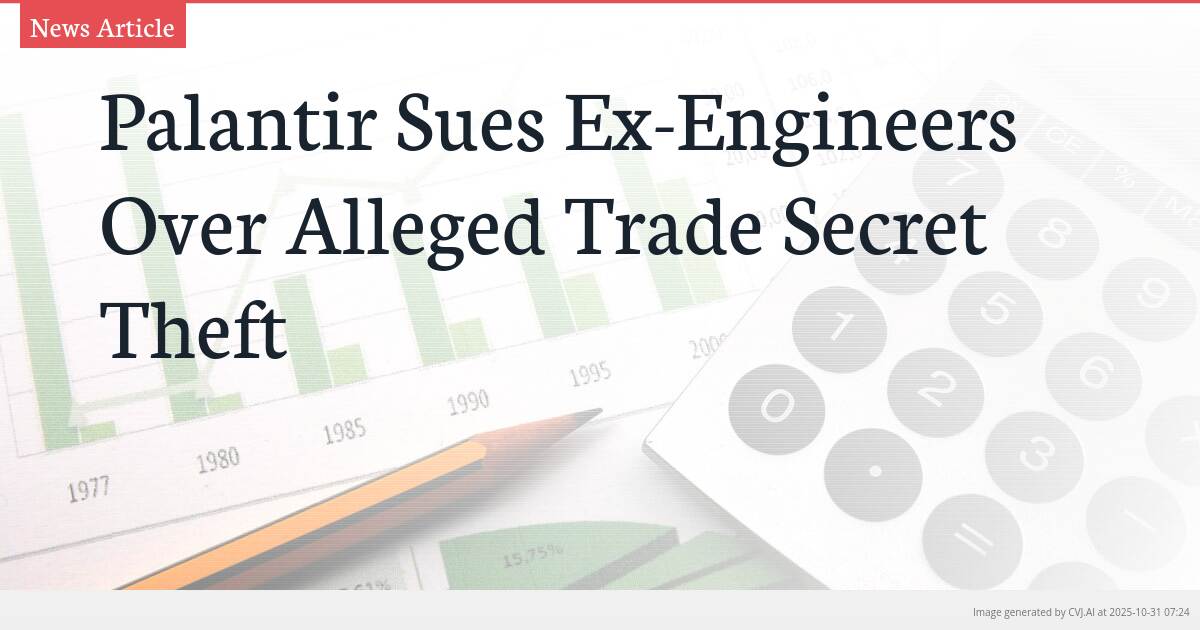This summary text is fully AI-generated and may therefore contain errors or be incomplete.
Introduction
Palantir Technologies has launched a federal lawsuit against two former senior AI engineers, alleging they orchestrated a sophisticated scheme to steal confidential documents and trade secrets to launch a competing AI startup. The data analytics giant claims Radha Jain and Joanna Cohen violated contractual obligations by building Percepta, an AI transformation company backed by venture capital firm General Catalyst, using what Palantir describes as its ‘crown jewels’—proprietary materials representing billions of dollars in investment.
Key Points
- Defendants allegedly transferred confidential Palantir documents including healthcare revenue cycle diagrams and internal demo frameworks before joining competitor Percepta
- General Catalyst CEO publicly acknowledged creating 'a version' of Palantir's business model while Percepta employs numerous former Palantir staff
- Palantir claims the stolen materials represent 'crown jewels' that could help competitors evade millions in R&D costs and irreparably harm market position
The Alleged Theft of Palantir's 'Crown Jewels'
According to the lawsuit filed in Manhattan federal court, the two former senior AI engineers were entrusted with Palantir’s most sensitive intellectual property, including source code, internal healthcare demonstration workspaces, deployed customer workflows, and proprietary customer engagement strategies. The complaint describes these materials as representing ‘billions of dollars of investment’ and alleges that the defendants systematically transferred them to support their new venture. Radha Jain, who helped design Palantir’s flagship AIP Logic, resigned in November 2024, while Joanna Cohen, a Healthcare Lead who built AI solutions for major clients, left in February.
The lawsuit provides specific details about the alleged document theft, claiming that Cohen sent herself highly confidential Palantir documents via Slack immediately after giving notice. These included a healthcare revenue cycle diagram, an internal demo framework, and a draft statement of work, which she later accessed on her personal phone. Palantir alleges both engineers kept their new employer secret, refused to sign separation agreements, and maintained unchanged LinkedIn profiles for months, characterizing their actions as a ‘months-long charade of deception and unfair competition.’
General Catalyst's Connection and Competitive Threat
The lawsuit reveals that Percepta, the AI transformation startup founded by the defendants, is owned by venture capital giant General Catalyst. During a Forbes interview, General Catalyst CEO Hemant Taneja publicly acknowledged Palantir’s value and admitted his firm was working on creating ‘a version’ of Palantir’s business. This admission takes on new significance given that Percepta emerged from stealth mode in October with a business model that directly mirrors Palantir’s and a team composed of nearly half former Palantir employees, including co-founder Hirsh Jain.
Palantir warns that in the hands of a competitor like Percepta, the stolen documents could be used to ‘shortcut over a decade of Palantir’s research’ and ‘evade millions of dollars in investment costs.’ The company claims Percepta could ‘replicate its most effective demonstrations’ and leverage stolen insights to win clients, potentially causing ‘irreparable harm’ to Palantir’s market position. The timing is particularly sensitive for Palantir, which recently secured a contract with the U.S. Army worth up to $10 billion over the next decade and won a $30 million contract to build ImmigrationOS for U.S. Immigration and Customs Enforcement.
Legal Ramifications and Contractual Violations
The defendants were paid ‘millions of dollars of compensation’ in exchange for agreeing to non-competition obligations barring them from competing for 12 months, non-solicitation clauses lasting 24 months, and confidentiality requirements, according to the lawsuit. Palantir is now seeking emergency injunctive relief to block Jain and Cohen from continuing their work at Percepta, legal fee reimbursement, and an extension of non-compete periods to cover the alleged breach period.
The case unfolds against the backdrop of Palantir’s extraordinary market performance, with the company valued at $461.54 billion after a 374.87% market-cap surge. Meanwhile, internal dynamics at the company were highlighted when Lisa Gordon, Palantir’s head of global communications, commented at The Information’s WTF Summit that the company’s shift toward the Trump administration is ‘concerning,’ noting that ‘a lot of the company is moving in a certain direction.’ The lawsuit represents a significant legal challenge for Palantir as it seeks to protect its intellectual property in the highly competitive AI market.
📎 Read the original article on decrypt.co

